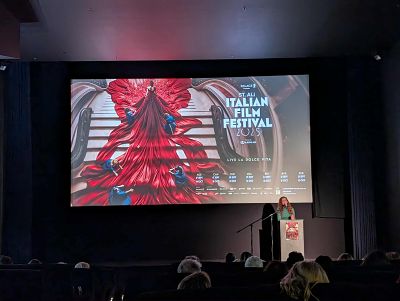
St. Ali Italian Film Festival 2025: Diamanti
Click here if you liked this article 11 ![]()
https://italianfilmfestival.com.au/
Date Reviewed: 04/09/2025
On Wednesday night, glasses of chardonnay and pinot noir flowed for guests at Palace Cinema Como's media screening of Turkish-Italian director/screenwriter Ferzan Özpetek’s Diamanti. The event offered a tantalising glimpse of the upcoming St. Ali Italian Film Festival 2025, a celebration of Italian cinema curated by Festival Director Elysia Zeccola for 26 years.
“We’re thrilled to be screening Özpetek’s latest,” Zeccola told the audience. “His films are always charged with beauty, humanity, and emotion. Our lineup this year is a true journey: across genres, across eras, and across Italy’s soul.”
A Poster as Portal
The Diamanti poster captures the film’s essence in a single, arresting image: a woman in a scarlet gown descends a grand staircase while seamstresses in blue kneel at her hem, fastening intricate details. It is a visual ode to Italy itself: a nation of passion, flair, and artistry, tempered by skill and sweat.
The image prefigures the film’s central metaphor: women as living “diamonds”, resilient, multifaceted, dazzling, forged under immense pressure. Like the poster, the narrative is equally layered, revealing different facets. [Spoiler alert: You do not actually see this scene in the film.
A Story Woven Across Time
Diamanti unfolds less as a linear narrative and more as a richly embroidered tapestry. Time shifts seamlessly between contemporary Rome and the 1970s, as Özpetek stitches together swatches of memory, imagination, and longing.
Eighteen celebrated actresses read a script before they are flung into it. Their characters are so deeply flawed they could have been created by Tennessee Williams: imperfect yet luminous, vulnerable yet defiant. Their stories intersect, sometimes clashing, sometimes harmonising, always textured:
-
A seamstress quietly mends dresses while concealing bruises from a violent husband.
-
A widow clings to tradition even as desire simmers beneath her composed exterior.
-
A mother mourns a child tragically run over, wrestling with grief that permeates her every gesture.
-
The atelier owner believes she has been jilted, only to discover her rival has been wheelchair-bound since the night of a lover’s betrayal.
-
A mother frets over a son who refuses to leave his room.
-
A single mother raises a child alone after her Turkish engineer lover departs, leaving behind a “worthless” jewel she believes is valuable, now forced to sell.
Men remain at the margins, absent, obstructive, peripheral, while the women take centre stage, shaping their destinies with needle, thread, and imagination.
Watching Diamanti once dazzles; a second viewing is needed to reveal hidden stitches, delicate threads, and nuanced glances.
Watch for codes: a recurring shade of pink evokes tenderness, blue signals solidarity, and scarlet flashes with desire and sacrifice. Buttons, fabrics, and textures all become symbols, guiding viewers through the emotional and moral contours of the story.
Özpetek’s maximalist camera caresses every fabric until it seems alive: bolts of silk shimmer like flowing rivers, sequins sparkle like constellations, even candy wrappings are used to show how a garment can become a light beam while pink buttons gleam like tiny promises of softness in a harsh world. The visual richness mirrors the characters’ inner lives, linking aesthetic splendour to resilience and humanity. Like a diamond revealing new facets each time it captures the light, the film has many facets.
As the credits rolled at Palace Como, one truth sparkled clearly: Diamanti is more than a film. It is itself a rare diamond in today's cinema, cut with precision, layered and dazzling, a perfect gem to anchor the St. Ali Italian Film Festival.
The festival runs in Melbourne from 19 September to 16 October, before touring Adelaide (17 September-14 October), Canberra (17 September-15 October), Sydney (18 September-15 October), Ballarat (20 September-16 October), Brisbane (24 September-22 October), Byron Bay and Ballina (25 September-15 October), and Perth (25 September-22 October).
Festival Director Zeccola also highlighted another gem: Signorinella. Director Angelo Pricolo was present to invite guests to the screening and Q&A on 20 September (Melbourne), a festival highlight blending cinema and conversation, much like the event itself.
Who’s it for:
-
Fans of Italian and European cinema
-
Lovers of character-driven, emotionally rich stories
-
Audiences interested in fashion, art, and 1970s cultural nostalgia
-
Viewers drawn to stories of female empowerment, creativity, and family ties
Highlights:
-
Auteur-driven storytelling: Directed and co-written by Ferzan Özpetek, reflecting his signature personal, expressive style.
-
Artistic craftsmanship: Costumes and set design integral to the narrative, celebrating creativity and attention to detail.
-
Emotional and cultural depth: Interconnected female characters explore resilience, memory, and solidarity.
-
Blend of tradition and modernity: Honours Italian cinematic legacies of neorealism and auteurism while engaging contemporary audiences.
-
Critical acclaim: Recognised with awards like Film of the Year at the Nastri d’Argento and Audience Award at the David di Donatello.
Reviewed by Mary Sinanidis